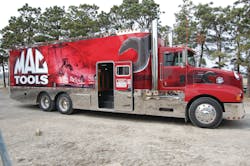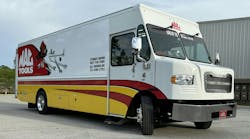The annual tool expos are right around the corner, and if you're not thinking about getting a new truck now, you might be once you see some on the show floor. Beyond wanting a shiny new toy for your business, make sure you also carefully consider all the aspects in the purchase decision. There's more to the purchase process than just how you will pay for the truck.
Gas or diesel?
When it comes to buying a new (or used) truck for your route, one of the key decisions that will directly affect your bottom line is fuel supply: Should you buy a gas or diesel vehicle?
“There are two types of emission controls currently on the market, Selective Catalytic Reduction System and Exhaust Gas Recirculation System. Most engine manufacturers have gone to the SCR system with the exception of International (Navistar) which uses the EGR system,” said Charles Carstens, owner of Atlanta Commercial Display Vans.
“SCR works by injecting automotive grade urea/water solution called Diesel Exhaust Fluid or DEF into the vehicles hot exhaust steam,” Carstens said. “The EGR System uses advanced fuel injection, air management, electronic controls and proprietary combustion technology.”
Callout: For more information on EPA’s diesel emissions regulations, check out www.epa.gov/otaq/highway-diesel/index.htm.
“Annual mileage is just one of the considerations when choosing between gasoline and diesel power,” said Brian Tabel, retail marketing manager for Isuzu Commercial Truck of America. “Lower mileage applications can favor gas, but this is dependent upon other factors, like body application, load ranges, typical route requirements and terrain.”
“Smaller routes in cities that maybe only cover 20 to 40 miles a day are good candidates for gas chassis,” said Frank Solofra, director of corporate accounts at Lynch Diversified Vehicles.
Overall price is also a consideration.
“Once pricing for the 2011 models (which meet the new 2010 emissions standards) came out, we saw more people considering the gas option,” said Solofra. “Chassis pricing has increased over $12,000 alone from 2007 and 2010 emissions, not to mention regular annual increases.”
Solofra said prior to the 2010 emission regulations, there wasn’t as much talk of gas engines in this category. And many still opt for diesel, he said.
As far as Isuzu goes, Tabel said the company’s low-cab-forward commercial trucks feature two 2010 EPA-compliant diesel engines, and spring 2011 will reintroduce its NPR N-Series of gas-powered trucks.
“The new Isuzu NPR ECO-MAX with Isuzu’s 4JJ1-TC diesel engine has demonstrated fuel savings of 20 percent from earlier models and is B-20 Bio-Diesel compatible,” Tabel said.
Solofra advised that distributors consider the service center they use or intend to use and its capabilities as far as chassis selection. “Most dealers will be sure that they have a good service center on their route for whatever chassis they are considering,” he said.
New or used?
For the budget-conscious buyer, another big consideration is whether to buy a used or new tool truck. For new trucks, you’ll need to do all of your usual due diligence evaluating manufacturers and specs. If you decide to go the used route, you’ll need to add research on make/model dependability, maintenance, recalls and repair histories.
Just like with cars, used tool trucks have their own issues to be wary of,” Solofra said. “No matter the condition of the vehicle, there are always unknowns with used vehicles. It is impossible to tell if/when the engine will go or what other problems you may run into.
“When looking at a used tool truck, you need to consider not just the chassis but, of course, the interior as well,” Solofra said. “It doesn’t matter if the truck is in great shape if you can’t display the tools the way that works for you.”
Tabel said that 80 percent of LCF Isuzu trucks delivered to the U.S. since 1986 are still in operation. These numbers bode well for the brand.
“If you are fortunate enough to find a used Isuzu truck, for added peace of mind, see your local dealer and ask about Isuzu’s Gold Star used truck warranty,” Tabel said.
Important questions for used trucks include “Are you purchasing from a reputable dealer?” and “Are there any warranties available or is it 'buyer beware?' ” Carstens said.
He advised using a tool truck leasing company or reputable tool truck builder when buying used. “Since they are providing the financing for the vehicle they are going to make sure the truck is serviced and everything is in good working condition.
“The most difficult purchase is when you purchase from an individual, especially someone that is getting out of the business. … If you are purchasing from an individual, check out the maintenance records. Ask to review and see invoices of work that has been performed on the vehicle. If you are not a mechanic, have someone that is check out the truck or require a DOT inspection,” Carstens said.
“There are a lot of good used vehicles out there and you can certainly save some money if you can find one that fits your needs,” Solofra said. He advised adding a few items to your checklist to consider with a used vehicle, like:
- Engine hours.
- Service and maintenance history.
- Additional money you may need to spend to refurbish or update the interior.
Layout options
Once you’ve decided on gas or diesel and evaluated whether to go new or used, interior layout is a major choice—especially since this most directly impacts your customers.
“Size and interior layout typically come down to two things: route characteristics and personal preference. If your route is compact, your customers’ parking lots are small, and you have a lot of tight spaces to fit into, a 24-foot cab-chassis probably isn’t the best choice,” said Solofra.
“My number one thing is retail space,” said Mark Brown, general manager at Summit Body Works. “The display is everything in a tool truck, and the more display area you create, the more useable it’s going to be. The thing that’s going to help the distributor the most by getting a new truck, other than the reliability, is if he can increase his display area.”
“If a new truck costs $120,000, what’s the square footage of shelf space worth? That becomes considerable,” advised Brown. “If you’ve gone to all this expense, and you’ve lost some shelf space, then you’ve just increased the cost per square foot of display area, in reality.”
Most dealers and franchisees have learned what is successful for them,” and are moving from a “mobile warehouse to more of a mobile retail environment,” Solofra said. “For those that aren’t so well prepared, LDV has designed, built, sold and maintained over 10,000 tool trucks in our 33 year history.” Solofra said they are more than ready to help design a van with the distributor.
One of LDV’s advancements for interior design is its VersaFlex Interior. The all-aluminum, fully adjustable interior setup is designed to help distributors become more retail-oriented in layout. VersaFlex shelves and display drawers are available in 24”, 30” and 36” widths; the system offers interchangeable shelves and drawers, and adjustable shelf angles, spacing and lighting options.
VersaFlex offers distributors the option to upgrade their truck’s current interior vs. buying a new truck. Some of the shelving options can be incorporated alongside current setups.
Other upgrades a distributor might consider (for a current or new truck) are adding satellite Internet, flat-panel monitors, LED lighting and keyless entry systems.
”One pitfall not to make is letting your truck look empty. … Don’t buy a truck that you can’t fill up,” Carstens said.
“The interior size of the trucks will have normally the same interior height at 84 inches and usually you have about 87 inches from wall to wall. The length would then vary from 18 feet to 24 feet. I tell a distributor to take masking tape and lay it out on the floor in their garage to get a better feel regarding how things might look and the flow of traffic,” Carstens said.
“Merchandising is very important in an interior layout. … The truck is the store and should have some thought behind the design of it,” Carstens said. “The tool truck builder can tell you what will work and what won’t.”
Carstens said that ACDV custom-builds interiors with the benefit of its own woodshop. So when a distributor asks for something unusual, “we can probably do it. … and there may be other distributors that might like the same thing,” Carstens said.
“The most important thing about size is you get the proper GVW for the weight that you are planning on carrying. …When you overload your truck you will cause premature failure of components such as tires, brakes, springs, engines and transmissions,” Carstens advised.
Buy vs. lease
The dealer’s financial situation is going to determine buying vs. leasing.
“We have people that do both, but the vast majority are leasing,” Solofra said. “When leasing, you will typically need to be in the vehicle a minimum of three years before you start to see any equity building up in the vehicle.
“Our advice for those leasing is to look at a few different options. We are seeing some pretty big differences between finance companies regarding residual payments, down payments and lease terms, all of which are going to have a major impact on the payment.”
Another factor in tool truck financing recalls the gas vs. diesel debate.
“Since the fuel economy is not as good and the durability of the engine is not as long as a diesel, the leasing or finance companies may not lease this vehicle over as long a period of time,” Carstens said. “With a shorter term on the lease for the gas motor, the monthly payment may be as high as the higher-priced diesel truck.”
“There are some tax considerations whether you buy or lease. I always tell distributors to consult with their tax advisor,” Carstens said.
Carstens and several distributors suggest looking into a home-equity loan for your truck purchase. Straight-up bank loans are more difficult though.
“Most banks are reluctant to loan on a tool truck. They will look up the blue book value on the truck and ask why you are paying $40,000 more than the book value,” Carstens said. “Most of them don’t understand the additional value that is added to the truck.” Banks also worry that if you default, they’ll be stuck with a specialized vehicle they’re not equipped to sell.
“This is why a leasing company with knowledge of the tool trucks is the best place for financing,” Carstens said. “They understand the business and they typically have a no or low down payment amount.”
There are lots of numbers to consider with a new truck, payments are part of that, but need to be considered in the right light.
“People equate the tool truck payment with their car or mortgage payments,” Summit’s Brown said. “But the reality is, what you’re buying is a revenue-creating piece of equipment.”
And there are benefits to upgrading your store.
“Do most second-time truck buyers’ sales increase with a new truck? Yes, they always seems to,” Brown said. “A lot of that can go back to increased display area and the distributor has a new attitude, a new purpose. He’s rejuvenated.”
Brown is also a former distributor and DM. His other main advice is to be more conventional when you design a new truck.
“Stay as close to the mainstream as possible. Which means a diesel, 22-foot, five-shelf-per-side, nice truck. Don’t do something crazy. Don’t put four toolbox pockets in it. … And other people have built trucks with no toolbox pockets,” Brown said. “Well, the reality is when you turn around to resell it, you’ve reduced your market to 5 percent.”


